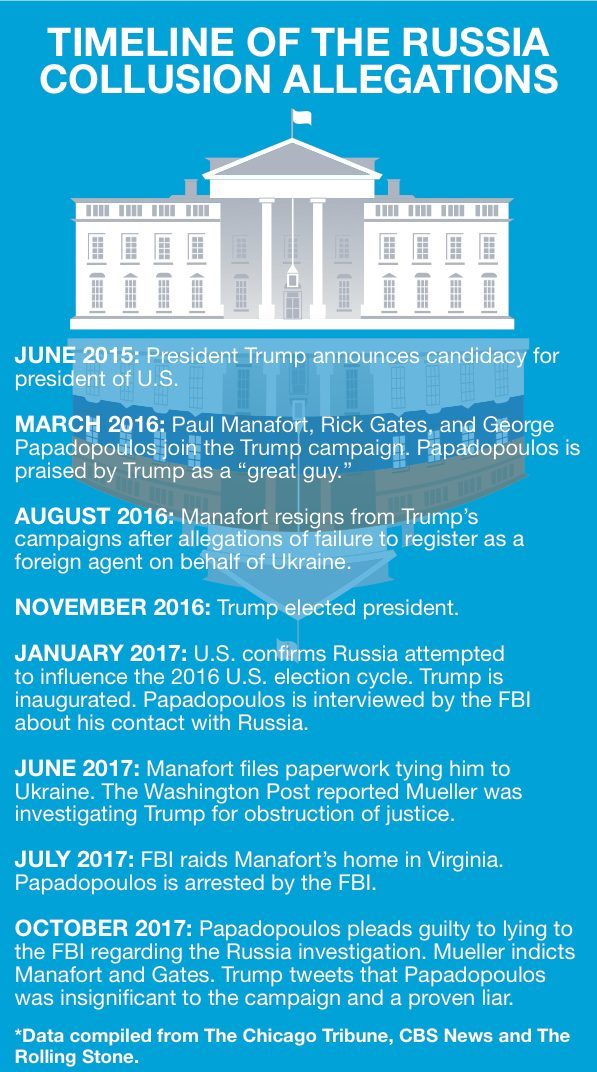Near the end of October, a 12 charge federal indictment was made against Paul Manafort and Rick Gates, former high-ranking members of the Trump campaign, prolonging a long-standing investigation of ties between the Trump administration and the Russian government. The arrest of George Papadopoulos, a former Trump foreign policy advisor, for lying to the FBI about contact with Russia, only strengthened the chaos undermining Trump’s character.
Dr. Katherine Dillion, professor of English, emphasized the importance of investigating every allegation, including allegations made against the Clinton campaign.
“I lived through Watergate,” Dillion said. “I was young at that time and didn’t understand the allegations. I was old enough to see little things to become bigger things. There’s so much evidence that’s creating smoke, that we have to keep looking for the fire. Whoever’s guilty of what, we just need to find out.”
Dr. Steven Breezeel, chair of the department of history and political science, said that appropriate definitions and tangible crimes still need to be presented.
“The challenge with all of it is the underlying crime,” Breezeel said. “Before impeachment or criminal charges can be made, there has to be a crime. The more appropriate terms are either conspiracy or improper coordination between the Trump campaign and Russia.”
The indictment made against Manafort and Gates includes charges of conspiracy against the U.S., conspiracy to launder money, failure to register as an agent of a foreign principal, making false and misleading Foreign Agents Registration Act (FARA) statements, false statements, and seven counts of failure to file reports of foreign bank and financial accounts. Though the charges sound ominous, they still hold no official links to the Trump administration.
“If they are convicted, they would be convicted of a financial crime, not involving Russia, but Ukraine,” Breezeel said. “As I understand it, the actions they’re focusing on are all before the campaign. So far there’s nothing that is directly connecting members of the Trump administration to the actions that are going on here.”

Graphic by Darrian Bagley
Breezeel said that the only room for illegality on Trump’s part is in the area of election law, saying there is not enough evidence at the time to support the possibility of impeachment.
“In terms of impeachment or resignation, I don’t see anything there,” Breezeel said. “However, the indictments could be used as leverage to gain cooperation in other matters.”
President of the Harding College Republicans junior Nathan Wagner spoke on the issue, referencing former FBI director James Comey.
“There was no evidence to begin with,” Wagner said. “Comey even admitted that Trump had no ties whatsoever. There’s no evidence of connection. If there were actually people coming forward about it, then it would be credible. That’s why these stories are being made up, to bash an administration.”
Wagner alluded to partisan politics, namely the position that the allegations are being made by Democrats as retribution for losing the election. Portrayal of the investigation has polarized the issue.
Dillion underscored the importance of considering a variety of sources, and said that it is not only our job as citizens, but our job as Christians to pursue the truth.
“I think that Christians and young people should educate themselves as much as they can, listen to a variety of opinion, and make it your job to educate yourself,” Dillion said. “We are not served by hiding the truth. We should find the facts and get the truth, even if it doesn’t benefit our chosen parties.”
Breezeel echoed her statement.
Wagner also emphasized the necessity of national unity beyond partisanship.
“Don’t judge anyone,” Wagner said. “ Even if you agree or disagree with Trump, we shouldn’t be hostile towards each other. As Americans, it seems like we’ve lost the ability to have a civil conversation. We need to come together.”
